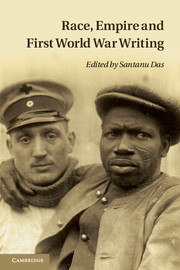Book contents
- Frontmatter
- Contents
- List of illustrations
- Acknowledgements
- Notes on contributors
- Introduction
- PART I VOICES AND EXPERIENCES
- PART II PERCEPTIONS AND PROXIMITIES
- PART III NATIONALISM, MEMORY AND LITERATURE
- 11 ‘He was black, he was a White man, and a dinkum Aussie’: race and empire in revisiting the Anzac legend
- 12 The quiet Western Front: the First World War and New Zealand memory
- 13 ‘Writing out of opinions’: Irish experience and the theatre of the First World War
- 14 ‘Heaven grant you strength to fight the battle for your race’: nationalism, Pan-Africanism and the First World War in Jamaican memory
- 15 Not only war: the First World War and African American literature
- Afterword Death and the afterlife: Britain's colonies and dominions
- Index
- References
12 - The quiet Western Front: the First World War and New Zealand memory
Published online by Cambridge University Press: 05 February 2014
- Frontmatter
- Contents
- List of illustrations
- Acknowledgements
- Notes on contributors
- Introduction
- PART I VOICES AND EXPERIENCES
- PART II PERCEPTIONS AND PROXIMITIES
- PART III NATIONALISM, MEMORY AND LITERATURE
- 11 ‘He was black, he was a White man, and a dinkum Aussie’: race and empire in revisiting the Anzac legend
- 12 The quiet Western Front: the First World War and New Zealand memory
- 13 ‘Writing out of opinions’: Irish experience and the theatre of the First World War
- 14 ‘Heaven grant you strength to fight the battle for your race’: nationalism, Pan-Africanism and the First World War in Jamaican memory
- 15 Not only war: the First World War and African American literature
- Afterword Death and the afterlife: Britain's colonies and dominions
- Index
- References
Summary
The story of the Great War and public memory is now much-trod, if contested, territory, and the title of this chapter picks up on some crucial markers of that debate. What is new is the application of these issues to New Zealand. In particular, we need to wrestle with the politics of a colony, or more exactly a dominion, of the British empire. This raises questions of cultural imperialism. As a result, the timing and the conclusions of the story are subtly different from the more familiar narrative in the old world.
The works referred to in the title are, first, Erich Maria Remarque's novel and the subsequent film, All Quiet on the Western Front, which sparked off the fashion for antiwar literature in Britain from 1928. Second, there is Brian Bond's monograph The Unquiet Western Front (2002). Bond argued that the memory of the Great War in Britain was largely captured by this antiwar writing. Mud, blood and horror became the war's enduring memory, promoted particularly by the public-school writers Siegfried Sassoon, Robert Graves and Edmund Blunden, whose books came out simultaneously with the translation of Remarque's novel in 1929. The image was reinforced in the 1960s by popular successes such as ‘Oh, What a Lovely War’ and in the 1990s by novels such as Sebastian Faulks's Birdsong (1993) and Pat Barker's Regeneration trilogy (1991–5). This memory, says Bond, has obscured the very real achievement of British forces in the Great War.
- Type
- Chapter
- Information
- Race, Empire and First World War Writing , pp. 231 - 248Publisher: Cambridge University PressPrint publication year: 2011
References
- 2
- Cited by

